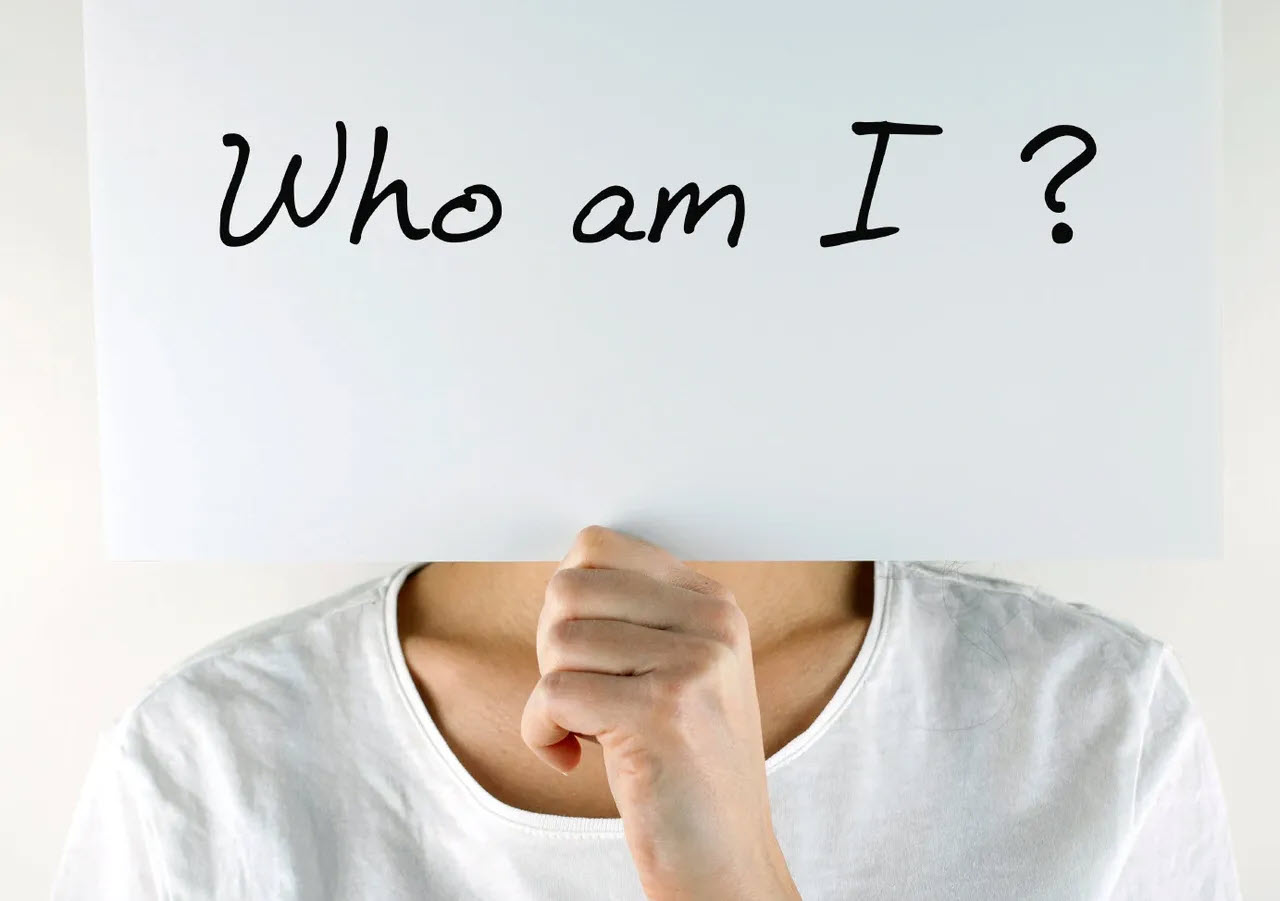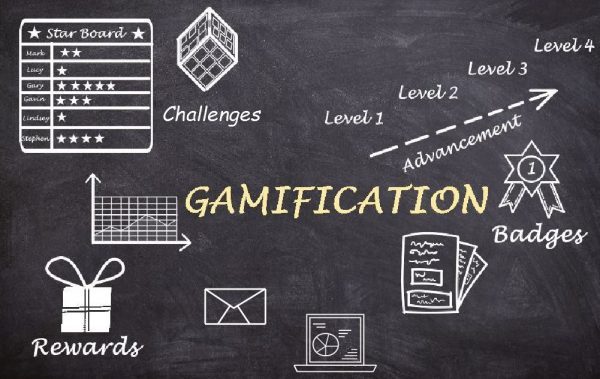Who Am I? – Consider the very many elements that comprise your own identity, and think about where they originated and what their implications are. How does your identity impact the way you approach the world and the way the world approaches you? How has this impacted you as a learner? As a teacher? (The intention of this assignment is to develop a shared language and understanding among participants in this course that will support each of us in discussing identity, culture, bias, stereotypes, and assets in meeting the individual needs of students in your classrooms.)
Resources
During this assignment, we spent time in the practice of self-discovery in the areas listed below. Before getting started on each section, we were to review the resources provided. There was an activity for each section, and all 6 sections needed to be completed: Identity Web, Cultural Iceberg, Stereotypes, Bias, assets, and final activity (video or reflection).
Identity Web
(affirming our identities)
- Watch a video with Lester and Katie discussing the practice of self-reflection
- See some example Identity Webs
Culture
- Culture in the Classroom
- Cultural Iceberg Theory
- Cultural Iceberg Criteria (example)
- Cultural Iceberg SLIDE Template
Stereotypes
Bias
- Test Yourself for Hidden Bias – Read the article and take the test. Screenshot your results in the Hidden Bias section below.
Assets
- Temple Grandin – The World Needs All Kinds of Minds (TED Talk)
- Next Gen Learning – Getting to Know Your Learning Profiles
- Helping All Learners – Learning Profile
Final Activity – Synthesis:
- Create your Personal Identity Story ~ A 5-minute video or written summary/reflection (via Word, PPT, or any other software platform). Make sure the link is accessible.
Activity 1: Identity Web
For this activity, we affirmed our identity through the creation of our own identity web. We needed to complete our web with at least twenty-five varied (visible and invisible) characteristics and reflect on five invisible characteristics and implications for each.
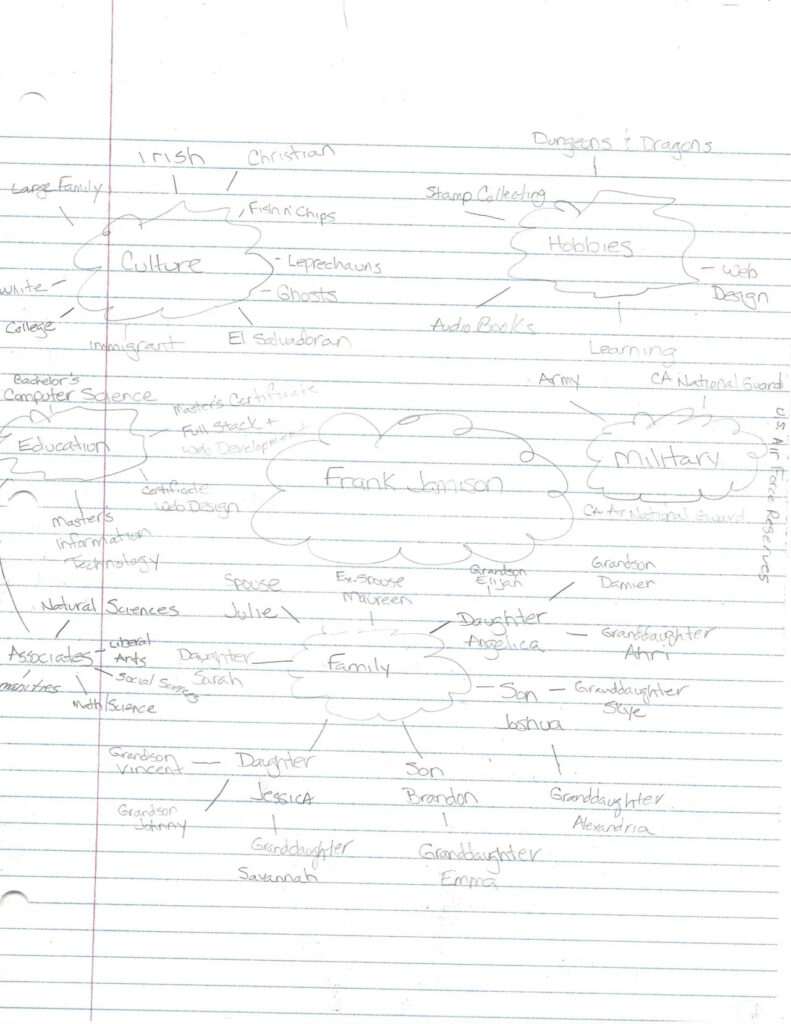
- Immigrant. Both of my parents were immigrants to the United States, my father was from Northern Ireland, and my mother was from El Salvador. Having been raised by my father, I was primarily exposed to the Irish culture, giving me a distinct Euro-centric outlook on the world.
- Christian. My Irish upbringing exposed me to Christianity. Most of my family is very religious, and I even have relatives in the clergy. While my core beliefs are based on Christianity, I am not overly religious myself.
- Education. Both of my parents attended college, though I am the only one in my immediate family who has earned a master’s degree. When I was younger, my father went to school at night to earn his bachelor’s degree, and education and learning have always been deemed a positive attribute in my family. I forgot that in high school, but have returned to it in my later years.
- Avid Reader/Listener. I have always had a love of literature, even in elementary school. My favorite book as a child was “Where the Red Fern Grows.” I also have a knack for poetry and started using it as an expression of love in the 6th grade. I still have several journals of the poetry I wrote in high school. My dad wasn’t much on expressing his feelings, and neither am I, but to be able to express my deepest emotions through poetry is a gift I will always cherish.
- Collector. My dad started me collecting stamps in the 2nd grade, and ever since, I have liked to collect things. Whether it is stamps, books, 3D modeling files, or movies, I love to collect things. I have the potential to be a borderline hoarder, but I’m getting better in my old age.
Activity 2: Cultural Iceberg
For this section, we needed to develop our own Cultural Iceberg and respond to some reflection questions.
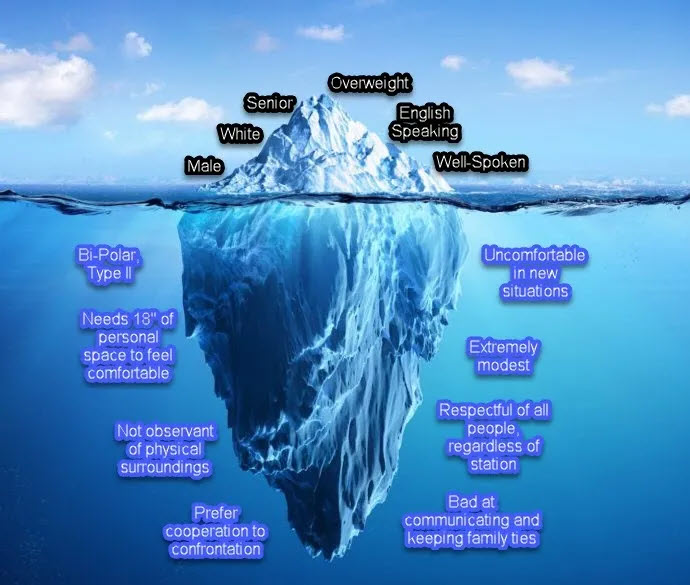
What cultural factors formed you, and what cultural norms do you navigate as a learner?
Coming from a broken home, I was raised by my father from a very early age, and though my mother is Hispanic, I was raised in a very white Irish culture. Neither of my parents was much on expressing emotions, so I have never learned how to do so either. Because of this, I am quite introverted and prefer learning on my own. This is why I have gravitated toward online learning since 2013.
Where do they complement each other, and where is there conflict?
My introverted nature and tendency toward self-sufficiency due to my bipolar type II condition have complimented my preferred learning style of distance education. I do well in one-to-one or small group situations but find it difficult and uncomfortable to work in large groups. This conflicts with my desire to be a teacher, as I will be surrounded by many students daily, but I am slowly working through this.
Plus your own thoughts and connections!
My aversion to confrontation has me worried about what to do with challenging students. I have a very sage on-the-stage idea of education that I experienced growing up that now seems at odds with current pedagogy. I am very interested in this new style of teaching.
Activity 3: Stereotype
For this section, engaged in exercises that address stereotypes in our society. Once complete, we were to respond to the reflection questions below.
Regardless of our good intentions, we live in a society filled with stereotypes and assumptions about race. We are constantly exposed to these ideas and beliefs, even when we don’t agree with them. Though you may not think of them daily, these stereotypes can influence your thoughts, beliefs, and feelings about individuals in different social categories.
In this exercise, go to Me, My Race, and I. Read the slideshow transcripts. Next, read the section labeled Go Deeper.
Reflection Questions:
Does race affect your every move? Have you never given it much thought?
Until I started my journey into the field of education, I never gave much thought to race.
Was this activity uncomfortable? Why?
This activity was very uncomfortable. I do not enjoy being looked at as the bad guy because I am white, and I am angry that this is the way people of color have felt for centuries in this country. It’s funny; even though my mother is from El Salvador, I still consider myself white. Weird.
Were there some groups you had more positive impressions of? Were there some you had more negative thoughts about? Why do you think this is?
I have always thought of Asians as being more intelligent. I never considered this was due to their culture and not their biology until I got older. Hispanics were always considered poor migrant workers. This was due to the way my family looked at Hispanics as a race. I know it’s not right, but it’s hard to overcome years of conditioning.
How might these stereotypes influence your opinions of families and students in your class? If you can provide some examples.
These stereotypes would raise my expectations for Asian students, possibly placing unrealistic burdens upon them. They would also lower my expectations for Hispanic students, though this would just make me want to spend more time with them to “bring them up to speed.”
What stereotypes do you think have been applied to you throughout your journey as a learner?
Because I’m Irish, I’m expected to be a belligerent drunk, though, in reality, I don’t drink and avoid confrontation like the plague. As a learner, I was never looked down upon because I am white and was raised in a middle-class family. I had access to books and a home set of encyclopedias growing up and every advantage you could think of.
What stereotypes do you think you may have applied to others?
I’ll admit that I grew up thinking African Americans and Hispanics were poorly educated, less intelligent, and more prone to crime and drug use. I’m ashamed to say so, but there it is. For some odd reason, I have also held the assumption that those who do not speak English are less intelligent. I know that’s not true, but it is what I was taught growing up.
How has that been helpful, and where has it created challenges for you?
This has created challenges for me in the past with underestimating people of color and not valuing them as equals.
Activity 4: Hidden Bias
For this activity, we were to provide a screenshot of our Hidden Bias Test (see Resource section for the link).
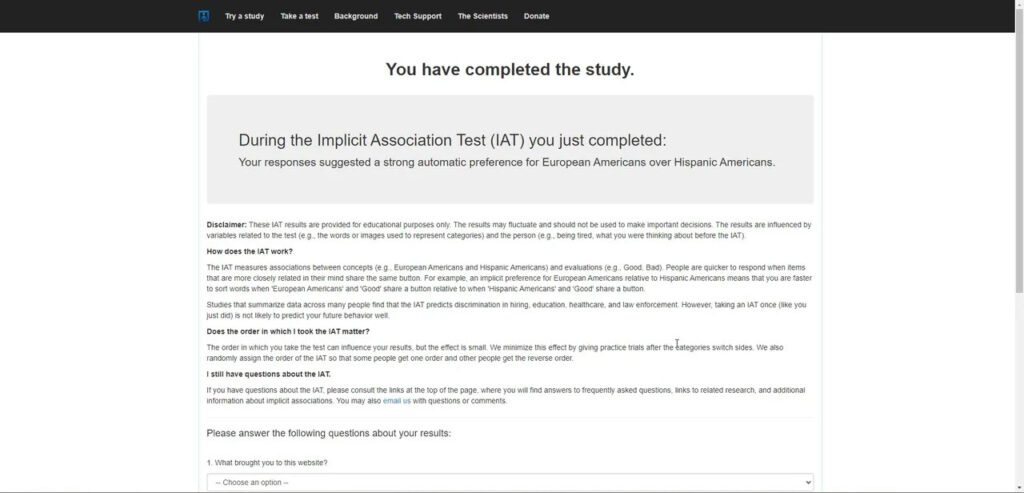
After posting the screenshot, we were to respond to the following reflection questions:
What biases do you think may have formed you, and what biases do you carry with you as a learner?
Though I am of Hispanic heritage, I was raised in a predominantly white environment. I have a bias toward European people and cultures over Hispanic ones and have a poorer innate view of people of color. I do try to compensate for this by making a conscious effort not to discriminate, but biases learned in the formative years are hard to overcome.
Where do they support your success, and where do they result in barriers?
My bias toward Eurocentricity has helped me immensely in my educational endeavors. I have never had to question why my race is not represented in books and media, I always have had positive role models in the sciences and in literature, and the history I was taught growing up always made me feel good about the accomplishments of my race. This Eurocentricity does create barriers when dealing with people of color, as negative stereotypes always color my thoughts in various interactions and scenarios.
Activity 5: Personal Assets and Supports
For this section, consider the questions below to fill out the table.
- What assets does your personal identity provide you with, and what supports do you need to leverage them (be specific)?
- Think of a specific time when you feel like your identity set you up to succeed: what was it about that circumstance that led to you feeling prepared, confident, and successful?
My Assets
- Computational Thinking
- Organizational Skills
- Formal Education in Computer Programming, Information Technology, and Web Design/Development
- Supportive Family, Friends, and Colleagues
- Irish and Christian Culture
- Empathy
- Resilience
Supports I Need…
- I need self-confidence. Believing in myself and my abilities is crucial for leveraging my personal identity assets effectively.
- To maximize the potential of my skills and knowledge, a commitment to lifelong learning is essential. I need to stay updated and open to new information and ideas.
- I need to seek guidance from mentors or role models who can offer insights and advice based on their experiences.
- I must embrace diversity and learn about different cultures to effectively engage with people from various backgrounds.
- I need to seek feedback from others and engage in regular self-reflection to assess my progress, identify areas for improvement, and build on my strengths.
One time I felt that my identity set me up to succeed was when I applied to the Encorps STEMx Tutoring Program. The program provides tutoring for middle school math students in disadvantaged schools in the Los Angeles area. I have a solid mathematical background and connect well with kids. I love helping people learn things and have done some tutoring in the past, both in college and with family and friends. I have been poor for most of my adult life and have raised my children in disadvantaged districts, so I could relate to some of the personal issues these students might be facing.
Activity 6: Final Synthesis
For this final activity, we were to synthesize everything we’ve learned above into a five-minute Personal Identity Story video. If we were not comfortable recording a video, we were allowed to summarize our findings in writing (minimum 1 page) using Microsoft Word or PowerPoint.
Assignment Grade: 24/24
